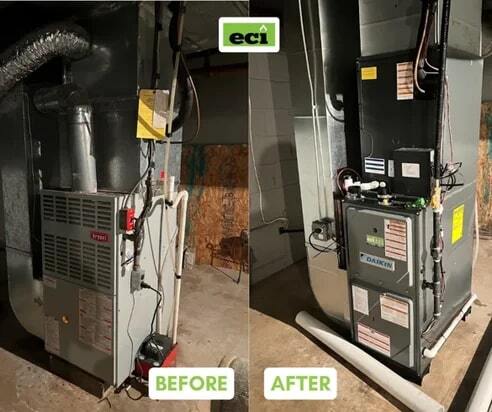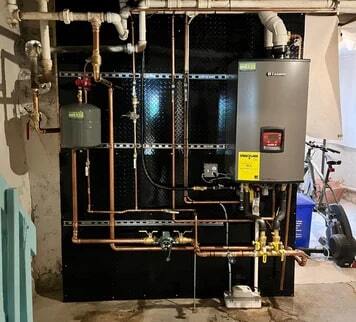When it comes to keeping your home warm and cozy, two common heating systems stand out: furnaces and boilers. While both serve the primary purpose of heating your living space, they operate in distinct ways, offering unique advantages. In this blog, we'll explore the differences between furnaces and boilers, focusing on their efficiency, heating methods, and considerations for choosing the best option for your home.
Furnaces: Efficient Forced Air Heating
Furnaces are a popular choice for home heating, known for their efficiency and ability to quickly warm up a space. They operate on the principle of forced air heating, where air is heated in a central location and then distributed throughout the house via ductwork and vents. The heating process begins when the furnace burner ignites fuel (commonly natural gas or propane) to produce heat. The warm air is then blown into the living spaces, raising the indoor temperature.

Advantages of furnaces
Quick Heating
Furnaces can rapidly raise the temperature of a room, providing near-instant comfort.
Even Heating Distribution
The forced air system ensures that warmth is evenly distributed throughout the house.
Boilers: Radiant Heating for a Cozy Ambiance
Boilers, on the other hand, use a different mechanism called radiant heating. Instead of heating air, boilers heat water or steam, which is then circulated through pipes and radiators or radiant floor systems. The heat is transferred directly to the surrounding surfaces, creating a comfortable and consistent warmth in the living space.

Advantages of boilers
Quiet Operation
Boilers operate more quietly than furnaces since they don't involve the movement of air.
Energy Efficiency
Radiant heating is often considered more energy-efficient, as there is minimal heat loss during distribution.
Choosing the Right Heating System for Your Home
Now that we've outlined the fundamental differences between furnaces and boilers, how do you determine which one is the best fit for your home? Here are some factors to consider.
Climate
If you live in a region with extremely cold winters, a furnace might be a more suitable option due to its quick and powerful heating capabilities.
Cost
Consider both the upfront costs and long-term operating costs. While boilers may have a higher initial investment, they might be more cost-effective over time due to their efficiency. Additionally, furnaces require ductwork to distribute. If your home is not equipped with ductwork, the cost of adding it may be high.
Space and layout
The layout of your home plays a crucial role. If you have a multi-story home, forced air from a furnace may be easier to distribute evenly. Radiant heating from a boiler, on the other hand, can be more effective in smaller or single-story homes.
Allergies
Forced air systems can sometimes circulate allergens, which may affect individuals with allergies. Boilers, by heating without circulating air, may be a better choice for those with respiratory sensitivities.
Conclusion
Both furnaces and boilers have their unique advantages, and the choice between them depends on various factors related to your home and personal preferences. By considering your climate, budget, home layout, and other factors, you can make an informed decision that ensures your home remains warm and comfortable throughout the seasons. Whether you opt for the quick warmth of a furnace or the cozy ambiance provided by a boiler, the key is to choose a heating system that aligns with your specific needs and preferences.
If you live in the Delaware Valley/Greater Philadelphia area and would like to find comfort within your home, visit our website or give us a call at 215 - 245 - 3200 to learn more.





